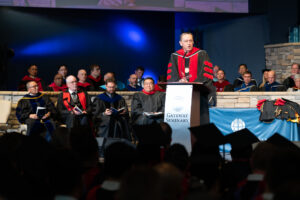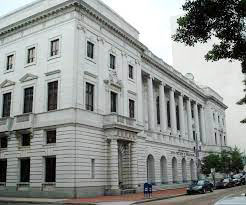
EDITORS’ NOTE: This is the third in a three-part series on Social Security.
ALEXANDRIA, Va. (BP)–Often, the ideas of political science and public policy are driven by theological concepts cloaked by public rhetoric, with words such as “compassion” and “morality.”
The modern discussion of reforming the Social Security system is such a case.
Each political party seeks to trump the other by naming itself the party of morality. Words such as “obligation” and “duty” accompany the debate to such an extent that the original tenets of the Social Security Act are obscured by an ignorance of the culture from which the very idea emerged in the first place. Then, as now, special interest groups courted the church in hopes of tapping into her influence with the general public.
By 1929, the American electorate had grown tired of the promises of President Herbert Hoover, who often said that prosperity was just ahead if only the nation would be patient. A capitalist system founded on a free market seemed unappealing in the face of widespread economic hardship.
Americans agreed that the need to exit that season of despair was in everyone’s best interest. The fertile soil for a drastic economic change was in the making, and strategies soon emerged which sought to combine the forces of the Marxist revolution in Russia with Protestant religious teaching.
Many religious leaders in mainline denominations lamented the bloodshed of the Marxists, but they admired the outcome. Joining forces with liberal social theorists, they thought the time had come for a revolution of their own — only this one was to be without bullets and blood. For their part, the revolution was biblically motivated.
In the spring of 1932, the New York East Conference of the United Methodist Church unanimously adopted a report which advocated that the federal government should immediately take over the production of goods and services for the entire nation. Every utility company should be turned into a public company, and all notions of business profit were rejected outright.
“The profit motive must go,” the report stated. “We must bring our economic order, the sick and wounded, to the Great Physician who can cure our social blindness and move us to love our brethren as we ought.”
An address by the Methodist Bishops was somewhat less extreme in their repudiation of capitalism, but they, too, called on everyone to “remake the whole structure of industrial life upon the teachings of Christ.”
By every indication, the Great Physician was the federal government –- not Jesus. The “cure” for the economic ailments of the nation was collectivism (or taxes), centralized government planning for every area of economic development, and government ownership for almost every form of industry.
The Christian Century, the leading Christian magazine of the day, recommended that the two major political parties be abolished in favor of one vehicle for a unified national policy. Writing in the publication that same year (1932), Dwight Bradley laid out a social program for the new party which the true church of Jesus Christ should support wholeheartedly. The plan advocated the full cooperation with the League of Nations; support of the Kellogg Peace Act; the end of any compulsory military training; full diplomatic recognition of the Soviet Union; immediate federal relief in the form of public works; old age, disability, and unemployment insurance; a national banking system; and the full use of the power of the federal government to tax personal incomes at will to finance the endeavor.
Many in the church felt that organized Christianity had become so tied to a capitalist system that it had lost its capacity to care for the poor and lift up the downcast. The only solution was to join forces with other social liberals who shared this common goal: the elimination or at least the amending of capitalism in the United States.
Seeing the success of Marx’s principles in Russia, many thought that his teachings, while misguided in some key areas, could be co-opted by the Christian church to re-work the American experiment on new terms. The church simply had to preach a social message relevant to the social crisis of the day. Many saw that without this new “voice for the people,” the church would have no real reason for existence in the industrial age.
The biblical Gospel suffered greatly at the hand of churchmen who, together with various social engineers, sought to make the world anew with little or no attention to Scripture as a guide. The failures of those religiously supported policies would soon hurt those they were originally designed to help and marginalize the church at the same time.
While affirming government’s role to care for its citizens, the church failed in its biblically mandated responsibility to care for the poor.
The coming battle over reforming Social Security brims with the same passion as the formation of the Social Security Act did in the first place. In many ways, however, the church of Jesus Christ is much weaker than it was in 1929. The absence of a carefully articulated Christian worldview has left open the probability that the church will now be drawn into a fight she is not ready to face. How the Bible relates to taxation, government pension plans, and public morality isn’t much of a concern to the modern church, who now occupies herself more with public relations rather than theological thought.
Without much effort at all, the church in 2005 may begin sounding like the church in 1932 — all the while thinking that she actually holds the truly “biblical” position.
–30–
Douglas Baker is associate pastor of First Baptist Church, Alexandria, Va.














